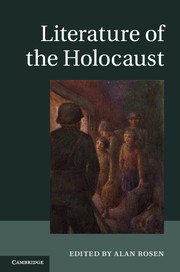Book contents
- Frontmatter
- Contents
- Notes on contributors
- Acknowledgments
- Introduction
- Part I Wartime victim writing
- Part II Postwar responses
- Chapter 3 The Holocaust and Italian literature
- Chapter 4 German literature and the Holocaust
- Chapter 5 Hebrew literature of the Holocaust
- Chapter 6 The Holocaust and postwar Yiddish literature
- Chapter 7 The Holocaust in Russian literature
- Chapter 8 The Holocaust in English-language literatures
- Chapter 9 Polish literature on the Holocaust
- Chapter 10 Hungarian Holocaust literature
- Chapter 11 French literature and the Holocaust
- Part III Other approaches
- Guide to further reading
- Index
- References
Chapter 10 - Hungarian Holocaust literature
Published online by Cambridge University Press: 05 June 2014
- Frontmatter
- Contents
- Notes on contributors
- Acknowledgments
- Introduction
- Part I Wartime victim writing
- Part II Postwar responses
- Chapter 3 The Holocaust and Italian literature
- Chapter 4 German literature and the Holocaust
- Chapter 5 Hebrew literature of the Holocaust
- Chapter 6 The Holocaust and postwar Yiddish literature
- Chapter 7 The Holocaust in Russian literature
- Chapter 8 The Holocaust in English-language literatures
- Chapter 9 Polish literature on the Holocaust
- Chapter 10 Hungarian Holocaust literature
- Chapter 11 French literature and the Holocaust
- Part III Other approaches
- Guide to further reading
- Index
- References
Summary
Numerous literary works, typically by survivors and their offspring and belonging to many genres, relate and try to understand the events of the Holocaust of the Jews of Hungary. The majority were written and published in the oppressive milieu of various phases of communist dictatorships as well as in the context of an ongoing and complex identity crisis concerning being Jewish. As a consequence, when we read these works together as they constitute one another’s immediate environment, there emerges not a conventional literary history but a marked social-literary process through which, for the majority of the Jews in postwar Hungary, the trauma of the Holocaust – the gaping absence it creates and represents – has replaced all forms of Judaism (both as a religion and/or tradition) as their main, or, in most cases, sole identity-creating force.
The special identity crisis emerges forcefully in the most representative work on the Holocaust in Hungarian: Imre Kertész’s tetralogy consisting of Fatelessness (1975), Fiasco (1988), Kaddish for an Unborn Child (1990), and Liquidation (2003). These four novels record the constant rethinking (and rewriting) of the story of the author’s deportation to the concentration camp universe as a fourteen-year-old together with his becoming a witness and eventually a witness-artist in the completely unresponsive social-cultural milieu of Hungary. The novels, by recounting over and over the events of the Holocaust, as well as not finding a receptive audience, create an increasingly obsessive persona who, in Kertész’s own words, becomes the “medium of Auschwitz.”
- Type
- Chapter
- Information
- Literature of the Holocaust , pp. 164 - 173Publisher: Cambridge University PressPrint publication year: 2013

